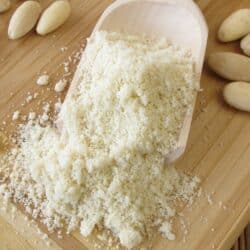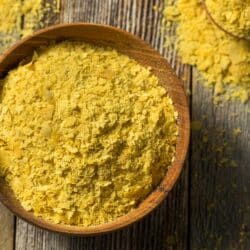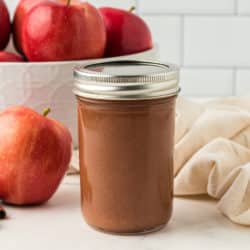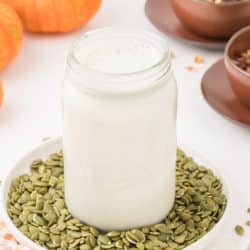7 Substitutes for Agar Agar Powder
If you need agar agar in a recipe, but don’t have any on hand, you’re in luck! There are many great substitutes that can give your food that same delicious flavor, nutrition, and texture. Here are some substitutes for agar agar including agar agar flakes, gelatin, cornstarch, arrowroot, guar gum, xanthan gum, and pectin powder.
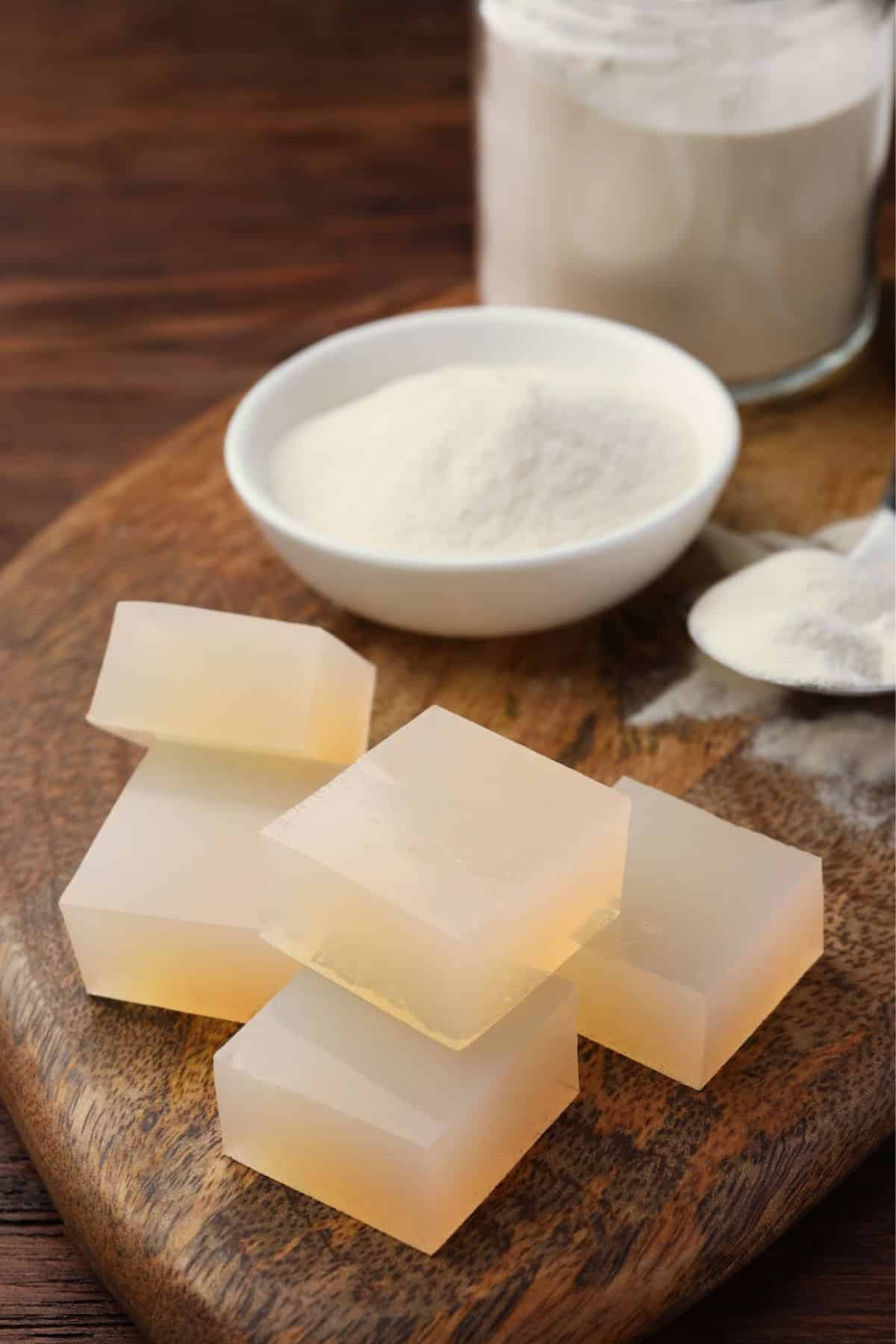
Overview of Agar Agar
Agar agar is a unique ingredient with thickening and gelling properties, similar to gelatin. You can find it in the baking aisle of most grocery stores or health food stores.
But unlike gelatin – which is made from animal collagen – agar agar is made from varieties of red algae related to seaweed. That makes it ideal for use in vegetarian or vegan recipes as one of the best gelatin substitutes.
It’s also considered a sustainable ingredient because the harvesting of seaweed has minimal impact on the environment.
How to Use It
Agar agar has little taste and usually comes in a powder form, usually a white powder.
To trigger its gelling properties as a plant-based thickener, you need to dissolve it in a liquid like water, fruit juice, or coconut milk, then boil it for a few minutes.
Agar agar sets firmly as it cools and – unlike gelatin – even remains set at room temperature. It’s also less prone to melting. I used it in my Vegan Panna Cotta recipe.
Culinary Uses
Agar agar is incredibly versatile and works well in all kinds of cuisines and dishes. It’s commonly used in:
- Japanese cuisine as a setting agent for sweets and desserts
- Chinese desserts and sweet soups
- A range of Korean dishes
- Dairy products like ice cream and yogurts, where it acts as a thickener without affecting flavor
- Soups, fruit purees, custards, and jellies as a setting agent
- Vegan and vegetarian dishes as a vegan substitute to gelatin, particularly in vegan marshmallows/gummies and in savory dishes like pates and terrines
- Molecular gastronomy, where it gives chefs the structure they need to create foams, spheres, gels, etc.

Substitutes for Agar Agar Powder
Here are some of the best options you have for an agar agar substitute, including how much you need to use.
1. Agar Agar Flakes
These are the best substitutes of all since they are virtually the same as the powder but in a less processed form.
They are made from the same seaweed – so you can enjoy identical health benefits – and the gelling property of the flakes is equal to the powder, too.
The main differences to keep in mind are that the flakes take longer than the powder to dissolve, and they are far less concentrated.
To substitute one teaspoon of agar agar powder, use one tablespoon of agar agar flakes.
2. Unflavored Gelatin
Gelatin powder is a popular and effective substitute for agar agar powder but the most important difference to consider is that it is not suitable for vegetarian or vegan recipes.
That’s because gelatin is made from animal collagen derived from skin, ligaments, tendons, and bones.
It also has a different gelling process and you need to bloom it in cold water before you use it.
To do this, you simply sprinkle it over the water (allow ¼ cup of water per envelope of gelatin), stir it gently, and wait for the powder to absorb the water. It will then have a gelatinous appearance.
Unlike agar agar, gelatin needs refrigeration to set. Remember that it may also melt more easily.
To substitute one teaspoon of agar agar powder, use one tablespoon of gelatin.
3. Cornstarch

While cornstarch doesn’t have the gelling properties of agar, it makes a great substitute in recipes where you need a thickening agent.
Made from the endosperm of corn kernels – and therefore suitable for vegans and vegetarians – it produces a creamy texture and is best suited to fluid dishes and sauces.
To prepare cornstarch for use, mix it with cold water to create a slurry. You can then add it to your dish.
Never add cornstarch directly to hot liquids as it will instantly form clumps!
You also need to take care not to overcook any mixture containing cornstarch, otherwise it will begin to break down and won’t thicken as effectively.
To substitute one teaspoon of agar agar powder, use one tablespoon of cornstarch mixed with cold water.
You may need to adjust this to achieve the exact texture you need.
4. Arrowroot Powder

Extracted from the roots of the arrowroot plant, arrowroot powder is a fine starch with very similar properties to cornstarch.
Again, it’s ideal for thickening but won’t form a gel, so you can only use it as a substitute for agar agar in dishes like sauces and soups. Just as with cornstarch, you’ll need to mix it with water before use to create a slurry.
Arrowroot powder has an advantage over cornstarch in that it sets to almost a clear gel. This means you can use it for glazes where you want to achieve a transparent, glossy effect.
It does, however, break down much more easily than cornstarch when heated, rapidly becoming less effective. For that reason, I recommend adding it at the very end of the cooking time in hot dishes.
To substitute one teaspoon of agar agar powder, use two teaspoons of arrowroot mixed with cold water.
You may need to adjust this to achieve the exact texture you need.
5. Guar Gum
Another vegetarian- and vegan-friendly alternative to agar, guar gum is a flavorless, fiber-rich ingredient that comes from the seed of the guar plant.
Unfortunately, it doesn’t gel like agar or gelatin, but it’s great for thickening sauces, soups, and dressings.
And the really good news is that it’s unaffected by heat and won’t break down, so it’s much easier to use than either cornstarch or arrowroot powder in hot dishes.
You can add it to liquids directly, but do so a little at a time and stir them immediately to prevent clumping.
Above all, be very mindful of the fact that guar gum is super potent, and a little goes a long way!
To substitute one teaspoon of agar agar powder, start with around ⅙ to ¼ teaspoon of guar gum and add more if needed.
6. Xanthan Gum
Xanthan gum is a substance produced by bacterial fermentation and is suitable for use in vegan and vegetarian dishes both hot and cold.
While it won’t work as a gelling agent, you can use it as a substitute for agar agar in fluid dishes that need thickening.
Just like guar gum, it’s very powerful, so always start by adding just a little to your dish and increasing the quantity as needed.
Unlike guar gum, however, it tends to clump if added to liquid and is best mixed with a dry ingredient like flour or sugar first. Alternatively, sprinkle it onto the liquid while whisking vigorously.
To substitute one teaspoon of agar agar powder, start with around ⅙ to ¼ teaspoon of xanthan gum and add more if needed.
7. Pectin Powder

When it comes to sweet dishes like jams, jellies, glazes, and desserts, pectin powder makes a great substitute for agar agar.
100% vegan, it’s made from fruit peels (mostly from citrus fruit) and is a good gelling agent, although it doesn’t set as firmly as agar. If you choose “rapid-set” or “quick-set” pectin, you’ll need to use it in a dish that calls for heat and sugar, or it won’t set properly.
Slow-set pectin (or freezer pectin) sets more slowly, but it doesn’t need heat or sugar and is suitable for a wider variety of dishes.
To substitute one teaspoon of agar agar powder, use three teaspoons of pectin powder.
More Substitute Articles You Might Like
Conclusions
It’s good to know that there are so many substitutes for agar agar available, many of which may be easier to find in your local grocery store. With a little experimentation, these alternatives will work well in its place, whether you need a gelatinous consistency for set foods or an effective thickener for sauces, soups, and more.
Don’t forget to join my newsletter list to get exclusive clean eating recipes and tips. The newsletter is 100% free with no spam; unsubscribe anytime.
About the Author: Carrie Forrest has a master’s degree in public health with a specialty in nutrition and is studying to be a holistic nutritionist. She is a top wellness and food blogger with over 5 million annual visitors to her site. Carrie has an incredible story of recovery from chronic illness and is passionate about helping other women transform their health. Send her a message through her contact form.



